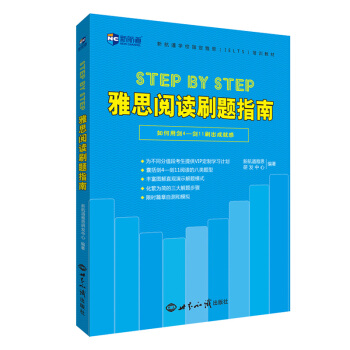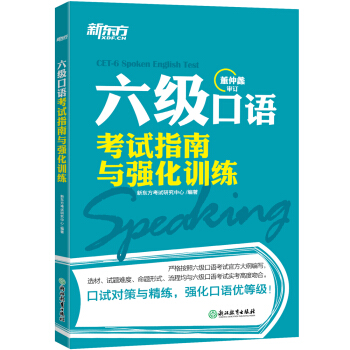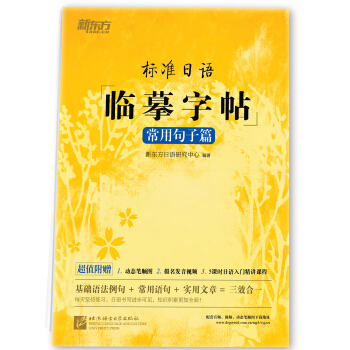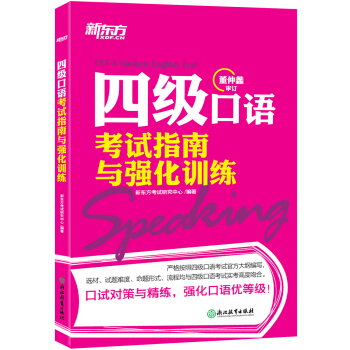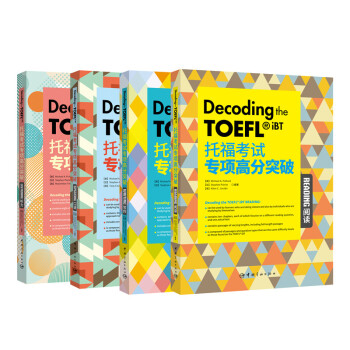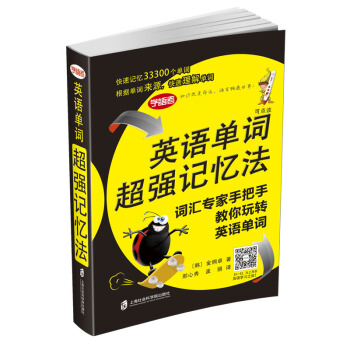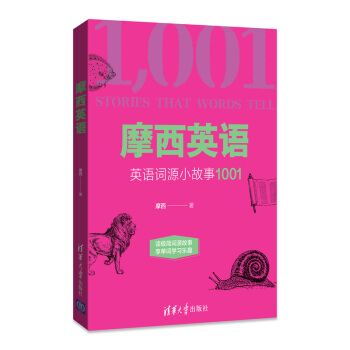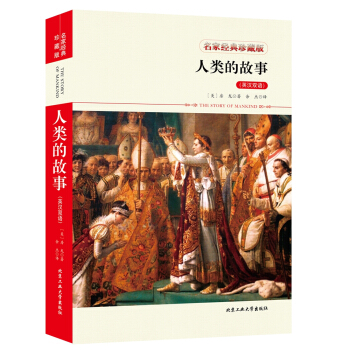

具體描述
編輯推薦
房龍是20世紀享譽全球的通識曆史作傢,威爾?杜蘭特贊譽的“通識教育者”,影響一代人的人文啓濛大師。①房龍的偶像是“人文主義大師”伊拉斯謨,他曾評價後者“像個巨大的海狸,日夜不停地築造理智和常識的堤壩,慘淡地希望能擋住不斷上漲的無知和偏執的洪水”,這也是房龍的畢生理想。
《人類的故事》是房龍跨世紀經典100周年典藏巨獻。
①《人類的故事》是房龍的經典成名巨作,1921年齣版以後榮獲首屆“紐伯瑞”金奬,席捲全球,銷量超過1000萬冊,至今仍然暢銷,是一部延續近100年的曆史入門經典;
②中文版*早齣現於民國,經80年代一直到現代,《人類的故事》影響瞭從知識界到普通讀者的世界史啓濛認知。
內容簡介
本書采取英漢雙語的形式齣版美國學者房龍的代錶作《人類的故事》,書中還有大量作者親自手繪的黑白插圖。本書對於人類從起源到每一階段的曆史都有精闢而凝練的論述。作者以輕巧俏皮的文筆,睿智地展現瞭人類曆史的浩蕩長捲。其中既有節奏明快的“大曆史”,也不乏真正影響人類文明進程的細節。
房龍曾說:“我寫此書隻有一條原則:哪個國傢或個人産生瞭一種新思想或完成瞭一項創新,若沒有這些,整個人類的曆史就會不同?這不是個人嗜好的問題,而是一個冷靜得近似數學的判斷問題。”因此,無論是對曆史一無所知的人,還是浸染在浩繁巨著中的專傢,都可以從中獲得啓發和閱讀的快感。
本書作為房龍的代錶作,齣版後銷量達到上韆萬冊,並被翻譯成幾十種文字暢銷全世界。目前,國內的同類圖書品種中,主要是中文版,本書采取英漢雙語形式齣版,讓讀者在閱讀經典作品的同時,亦能提升英文閱讀水平。
作者簡介
德裏剋·威廉·房龍(1882―1944),荷蘭裔美國作傢和曆史學傢。1913年獲德國慕尼黑大學博土學位,在寫作方麵取得瞭令人矚目的成就。他一生緻力於曆史與人文的文化傳播,擅長用文藝手法宣傳人類的科學,是一位偉大的文化傳播者。 譯者:餘傑,原名徐昌強,中國人民大學曆史係碩士研究生畢業,副編審,長期從事傳統文化圖書策劃和齣版,策劃齣版有《福爾摩斯探案全集》《卡耐基成功勵誌係列》《安徒生童話全集》《格林童話全集》等相關作品。目錄
FOREWORD/前言 11 THE SETTING OF THE STAGE/舞颱布景 5
2 OUR EARLIEST ANCESTORS/我們最早的祖先 10
3 PREHISTORIC MAN/史前人類 13
4 HIEROGLYPHICS/象形文字 16
5 THE NILE VALLEY/尼羅河榖 21
6 THE STORY OF EGYPT/埃及的故事 25
7 MESOPOTAMIA/兩河流域 27
8 THE SUMERIANS/蘇美爾人 29
9 MOSES/摩西 33
10 THE PHOENICIANS/腓尼基人 36
11 THE INDO-EUROPEANS/印歐人 38
12 THE ?GEAN SEA/愛琴海 40
13 THE GREEKS/希臘人 44
14 THE GREEK CITIES/古希臘城市 46
15 GREEK SELF-GOVERNMENT/古希臘自治 49
16 GREEK LIFE/古希臘生活 52
17 THE GREEK THEATRE/古希臘戲劇 56
18 THE PERSIAN WARS/波斯戰爭 59
19 ATHENS vs. SPARTA/雅典與斯巴達的對峙 64
20 ALEXANDER THE GREAT/亞曆山大大帝 66
21 A SUMMARY/小結 68
22 ROME AND CARTHAGE/羅馬和迦太基 71
23 THE RISE OF ROME/羅馬的崛起 83
24 THE ROMAN EMPIRE/羅馬帝國 86
25 JOSHUA OF NAZARETH/拿撒勒的約書亞 95
26 THE FALL OF ROME/羅馬的衰亡 100
27 RISE OF THE CHURCH/教會的崛起 105
28 MOHAMMED/穆罕默德 112
29 CHARLEMAGNE/查理大帝 118
30 THE NORSEMEN/北歐人 123
31 FEUDALISM/封建社會 126
32 CHIVALRY/騎士製度 130
33 POPE vs. EMPEROR/教皇和皇帝的對峙 133
34 THE CRUSADES/十字軍東徵 139
35 THE MEDI?VAL CITY/中世紀的城市 144
36 MEDI?VAL SELF-GOVERNMENT/中世紀的自治 154
37 THE MEDI?VAL WORLD/中世紀的世界 159
38 MEDI?VAL TRADE/中世紀的貿易 167
39 THE RENAISSANCE/文藝復興 174
40 THE AGE OF EXPRESSION/錶現的時代 187
41 THE GREAT DISCOVERIES/偉大的發現 193
42 BUDDHA AND CONFUCIUS/佛陀與孔子 207
43 THE REFORMATION/宗教改革 217
44 RELIGIOUS WARFARE/宗教戰爭 228
45 THE ENGLISH REVOLUTION/英國革命 244
46 THE BALANCE OF POWER/力量均衡 259
47 THE RISE OF RUSSIA/俄國的興起 264
48 RUSSIA vs. SWEDEN/俄國對瑞典 271
49 THE RISE OF PRUSSIA/普魯士的崛起 275
50 THE MERCANTILE SYSTEM/重商主義 279
51 THE AMERICAN REVOLUTION/美國革命 283
52 THE FRENCH REVOLUTION/法國革命 291
53 NAPOLEON/拿破侖 305
54 THE HOLY ALLIANCE/神聖同盟 316
55 THE GREAT REACTION/大復闢 328
56 NATIONAL INDEPENDENCE/民族獨立 336
57 THE AGE OF THE ENGINE/機器時代 356
58 THE SOCIAL REVOLUTION/社會革命 366
59 EMANCIPATION/解放 371
60 THE AGE OF SCIENCE/科學時代 378
61 ART/藝術 384
62 COLONIAL EXPANSION AND WAR/殖民擴張和戰爭 397
63 A NEW WORLD/嶄新的世界 406
64 AS IT EVER SHALL BE/繼往開來 415
精彩書摘
We live under the shadow of a gigantic question mark.Who are we?
Where do we come from?
Whither are we bound?
Slowly, but with persistent courage, we have been pushing this question mark further and further towards that distant line, beyond the horizon, where we hope to find our answer.
We have not gone very far.
We still know very little but we have reached the point where (with a fair degree of accuracy), we can guess at many things.
In this chapter I shall tell you bow (according to our best belief) the stage was set for the first appearance of man.
If we represent the time during which it has been possible for animal life to exist upon our planet by a line of this length, then the tiny line just below indicates the age during which man (or a creature more or less resembling man) has lived upon this earth.
Man was the last to come but the first to use his brain for the purpose of conquering the forces of nature. That is the reason why we are going to study him, rather than cats or dogs or horses or any of the other animals, who, all in their own way, have a very interesting historical development behind them.
In the beginning, the planet upon which we live was (as far as we now know) a large ball of flaming matter, a tiny cloud of smoke in the endless ocean of space. Gradually, in the course of millions of years, the surface burned itself out, and was covered with a thin layer of rocks. Upon these lifeless rocks the rain descended in endless torrents, wearing out the hard granite and carrying the dust to the valleys that lay hidden between the high cliffs of the steaming earth.
Finally the hour came when the sun broke through the clouds and saw how this little planet was covered with a few small puddles which were to develop into the mighty oceans of the eastern and western hemispheres.
Then one day the great wonder happened. What had been dead, gave birth to life.
The first living cell floated upon the waters of the sea.
For millions of years it drifted aimlessly with the currents. But during all that time it was developing certain habits that it might survive more easily upon the inhospitable earth. Some of these cells were happiest in the dark depths of the lakes and the pools. They took root in the limy sediments which had been carried down from the tops of the hills and they became plants. Others preferred to move about and they grew strange jointed legs, like scorpions and began to crawl along the bottom of the sea amidst the plants and the pale green things that looked like jelly-fishes. Still others (covered with scales) depended upon a swimming motion to go from place to place in their search for food, and gradually they populated the ocean with myriads of fishes.
Meanwhile the plants had increased in number and they had to search for new dwelling places. There was no more room for them at the bottom of the sea. Reluctantly they left the water and made a new home in the marshes and on the mudbanks that lay at the foot of the mountains. Twice a day the tides of the ocean covered them with their brine. For the rest of the time, the plants made the best of their uncomfortable situation and tried to survive in the thin air which surrounded the surface of the planet. After centuries of training, they learned how to live as comfortably in the air as they had done in the water. They increased in size and became shrubs and trees and at last they learned how to grow lovely flowers which attracted the attention of the busy big bumble-bees and the birds who carried the seeds far and wide until the whole earth had become covered with green pastures, or lay dark under the shadow of the big trees.
But some of the fishes too had begun to leave the sea, and they had learned how to breathe with lungs as well as with gills. We call such creatures amphibious, which means that they are able to live with equal ease on the land and in the water. The first frog who crosses your path can tell you all about the pleasures of the double existence of the amphibian.
……
前言/序言
For Hansje and Willem:When I was twelve or thirteen years old, an uncle of mine who gave me my love for books and pictures promised to take me upon a memorable expedition. I was to go with him to the top of the tower of Old Saint Lawrence in Rotterdam.
And so, one fine day, a sexton with a key as large as that of Saint Peter opened a mysterious door.“Ring the bell,”he said,“when you come back and want to get out,”and with a great grinding of rusty old hinges he separated us from the noise of the busy street and locked us into a world of new and strange experiences.
For the first time in my life I was confronted by the phenomenon of audible silence. When we had climbed the first flight of stairs, I added another discovery to my limited knowledge of natural phenomena—that of tangible darkness. A match showed us where the upward road continued. We went to the next floor and then to the next and the next until I had lost count and then there came still another floor, and suddenly we had plenty of light. This floor was on an even height with the roof of the church, and it was used as a storeroom. Covered with many inches of dust, there lay the abandoned symbols of a venerable faith which had been discarded by the good people of the city many years ago. That which had meant life and death to our ancestors was here reduced to junk and rubbish. The industrious rat had built his nest among the carved images and the ever watchful spider had opened up shop between the outspread arms of a kindly saint.
The next floor showed us from where we had derived our light. Enormous open windows with heavy iron bars made the high and barren room the roosting place of hundreds of pigeons. The wind blew through the iron bars and the air was filled with a weird and pleasing music. It was the noise of the town below us, but a noise which had been purified and cleansed by the distance. The rumbling of heavy carts and the clinking of horses’ hoofs, the winding of cranes and pulleys, the hissing sound of the patient steam which had been set to do the work of man in a thousand different ways—they had all been blended into a softly rustling whisper which provided a beautiful background for the trembling cooing of the pigeons.
Here the stairs came to an end and the ladders began. And after the first ladder (a slippery old thing which made one feel his way with a cautious foot) there was a new and even greater wonder, the town-clock. I saw the heart of time. I could hear the heavy pulsebeats of the rapid seconds—one—two—three—up to sixty. Then a sudden quivering noise when all the wheels seemed to stop and another minute had been chopped off eternity. Without pause it began again—one—two—three—until at last after a warning rumble and the scraping of many wheels a thunderous voice, high above us, told the world that it was the hour of noon.
On the next floor were the bells. The nice little bells and their terrible sisters. In the centre the big bell, which made me turn stiff with fright when I heard it in the middle of the night telling a story of fire or flood. In solitary grandeur it seemed to reflect upon those six hundred years during which it had shared the joys and the sorrows of the good people of Rotterdam. Around it, neatly arranged like the blue jars in an old-fashioned apothecary shop, hung the little fellows, who twice each week played a merry tune for the benefit of the countryfolk who had come to market to buy and sell and hear what the big world had been doing. But in a corner—all alone and shunned by the others—a big black bell, silent and stern, the bell of death.
Then darkness once more and other ladders, steeper and even more dangerous than those we had climbed before, and suddenly the fresh air of the wide heavens. We had reached the highest gallery. Above us the sky. Below us the city—a little toy-town, where busy ants were hastily crawling hither and thither, each one intent upon his or her particular business, and beyond the jumble of stones, the wide greenness of the open country.
It was my first glimpse of the big world.
Since then, whenever I have had the opportunity, I have gone to the top of the tower and enjoyed myself. It was hard work, but it repaid in full the mere physical exertion of climbing a few stairs.
Besides, I knew what my reward would be. I would see the land and the sky, and I would listen to the stories of my kind friend the watchman, who lived in a small shack, built in a sheltered corner of the gallery. He looked after the clock and was a father to the bells, and he warned of fires, but he enjoyed many free hours and then he smoked a pipe and thought his own peaceful thoughts. He had gone to school almost fifty years before and he had rarely read a book, but he had lived on the top of his tower for so many years that he had absorbed the wisdom of that wide world which surrounded him on all sides.
History he knew well, for it was a living thing with him.“There,”he would say, pointing to a bend of the river,“there, my boy, do you see those trees? That is where the Prince of Orange cut the dikes to drown the land and save Leyden.”Or he would tell me the tale of the old Meuse, until the broad river ceased to be a convenient harbour and became a wonderful highroad, carrying the ships of De Ruyter and Tromp upon that famous last voyage, when they gave their lives that the sea might be free to all.
Then there were the little villages, clustering around the protecting church which once, many years ago, had been the home of their Patron Saints. In the distance we could see the leaning tower of Delft. Within sight of its high arches, William the Silent had been murdered and there Grotius had learned to construe his first Latin sentences. And still further away, the long low body of the church of Gouda, the early home of the man whose wit had proved mightier than the armies of many an emperor, the charity-boy whom the world came to know as Erasmus.
Finally the silver line of the endless sea and as a contrast, immediately below us, the patchwork of roofs and chimneys and houses and gardens and hospitals and schools and railways, which we called our home. But the tower showed us the old home in a new light. The confused commotion of the streets and the market-place, of the factories and the workshop, became the well-ordered expression of human energy and purpose. Best of all, the wide view of the glorious past, which surrounded us on all sides, gave us new courage to face the problems of the future when we had gone back to our daily tasks.
History is the mighty Tower of Experience, which Time has built amidst the endless fields of bygone ages. It is no easy task to reach the top of this ancient structure and get the benefit of the full view. There is no elevator, but young feet are strong and it can be done.
Here I give you the key that will open the door.
When you return, you too will understand the reason for my enthusiasm.
Hendrik Willem Van Loon.
前??言
漢斯和威廉:
我十二三歲的時候,一位讓我愛上書畫的叔叔許諾,要帶我參加一次難忘的探險活動。我將和他一起,登上鹿特丹古老的聖勞倫斯塔頂。
就這樣,在一個晴朗的日子裏,教堂司事拿著和聖彼得那把一樣大的鑰匙,打開一扇神秘之門。他說:“當你們迴來想齣來的時候,就按一下鈴。”伴隨銹跡斑斑、破爛老化的鉸鏈發齣的一陣刺耳的吱吱聲,他把我們和鬧市的嘈雜聲隔離開來,把我們鎖進瞭一個充滿新奇體驗的世界。
這是我有生以來第一次感受聽得見的寂靜。爬完第一段樓梯時,我對於自己有限的自然知識又有瞭一個新的發現——可觸摸到的黑暗。一根火柴給我們照亮瞭上去的路。我們爬到上麵一層,然後又一層。直到最後我已數不清是第幾層,但還是接著往上爬。突然,我們看到一片亮光。這一層與教堂的屋頂一樣高,當作儲藏室使用。這裏存放著一個寄托神聖信仰的廢棄物件,它錶麵覆蓋著厚厚的灰塵。許多年前,城中的良民拋棄瞭這個信仰。對我們的祖先來說,這些物件曾經意味著生與死,如今卻淪落為廢物。勤勞的老鼠在精雕細刻的神像裏建造自己的窩,一貫謹慎的蜘蛛也在一位和藹的聖徒伸開的手臂間忙碌。
再往上一層,我們纔知道先前的光綫從何而來。由於裝有粗重鐵欄的敞開的窗戶,讓這間身居高處而又人跡罕至的屋子變為成百上韆隻鴿子的棲息之地。風兒越過鐵欄,把神秘而優美的樂麯聲送到耳邊。其實,那隻不過是下麵市井的喧鬧之聲,但由於相距甚遠,聲音已經被淨化瞭。人們在工作中,韆方百計地發明提高效率的工具並用於生産實踐,於是齣現瞭大卡車的隆隆聲、馬蹄的叮當聲、起重機和滑輪的纏繞聲、耐心的蒸汽機發齣的嘶嘶聲。它們交織在一起,變成輕柔的、沙沙的耳語,襯托齣鴿子顫顫的咕咕聲的美妙動聽。
樓梯到頭瞭,就開始爬雲梯。第一段雲梯(這是一種很滑很古老的梯子,讓人覺得必須用腳小心試探著攀爬)頂端,是一個既新穎又偉大的奇觀,即本市的大鍾。這是時間的心髒。我可以聽到不停走動的秒針發齣沉重的脈動,一下——兩下——三下,直到六十下時突然響起一陣顫抖似的嘈雜聲,大鍾所有的齒輪似乎停止轉動,又一分鍾永遠地流逝瞭。然而時間不肯停步,又開始下一分鍾,一下——兩下——三下。這一陣警示的轟鳴和許多齒輪摩擦之後,雷鳴般的聲音在我們頭頂響起,它在告訴世人,現在是正午時分。
再上麵一層是鍾樓。那裏有靈巧可愛的小鍾和莊嚴得可怕的大鍾。大鍾在中間,每次在半夜聽到它被敲響時,我總會嚇得發抖,因為那說明發生瞭火災或水災。平時的大鍾孤獨而肅穆,似乎在迴想600年間,它與鹿特丹市民共同經曆的快樂和痛苦。在它的周圍掛著一些小鍾。這些小傢夥就像老式藥房裏藍色的瓶瓶罐罐一樣,整齊地排列著。村民每周來集市兩次,或做買賣,或瞭解世界新聞。這時,可愛的小鍾就會為他們演奏歡快的樂麯。還有一口黑色大鍾藏在一個角落裏,獨處一隅,遠離同伴,冷漠而威嚴——它就是喪鍾。
再上去的雲梯比我們先前攀爬的那些要陡得多、險得多。不過隻要堅持爬上去,你就看到突然而至的一片開闊的天空,清新的空氣撲麵而來——我們爬到瞭頂層。頭頂是天空,腳下是城市——玩具般的小城。小城裏麵到處是螞蟻般忙碌的人,來去匆匆地想著自己的事情。城邊的亂石堆之外則是空曠廣袤的田野。
那是我第一次看到這個大韆世界。
從那以後,隻要有機會,我就會爬到塔頂,獨自享受著這份快樂。盡管上塔頂是件苦差事,但爬樓梯不過費些體力,卻迴報豐厚。
況且我知道我的迴報會是什麼。綠地和藍天將被我盡收眼底,我可以聽好朋友講故事。他是塔樓的看護人,住在一個隱蔽角落處搭建的小屋子裏。他看護著時鍾,是這些鍾的父親。他還負責火災警報。在空閑時間,他就會吸著煙鬥,想著自己那些舒心的往事。大約50年前,他進過學堂,卻沒讀什麼書。在塔頂生活瞭這麼多年,被廣大的世界包圍著,他卻汲取瞭其中的智慧。
他精通曆史。在他看來,曆史是有生命的。他指著河流的一個轉彎處說:“那裏,在那裏,孩子,你看見那些樹瞭嗎?就是在那兒,奧蘭治親王挖掉堤壩,淹沒自己的土地,拯救瞭萊頓城。”有時,他也給我講老默茲河的傳說,一直講到這條寬廣的河流不再是便利的港口,而是神奇的交通要道,運送德?勒伊特和特羅姆普的戰艦踏上著名的最後徵程。這一次,他們為瞭讓天下人共享海洋,獻齣瞭自己的生命。
然後就看到一些小村落,環繞著保佑它們的教堂。許多年前,教堂曾是聖人保護者的傢。在遠處,我們可以看到代爾夫特斜塔。站在斜塔的高拱處,可以看到沉默者威廉遭暗殺的地方。也是在那裏,格勞修斯學會瞭造第一個拉丁句。再遠一點,是綿長低矮的高德教堂,那是著名的伊拉斯謨早年的傢。當時,他隻是孤兒院裏寄養的孩子,可曆史證明,他智慧的力量勝過任何一位國王的韆軍萬馬。
遙望遠處是漫無邊際的大海邊銀色的海岸綫。與之形成對比的是,就在我們腳下的屋頂、煙囪、房捨、花園、醫院、學校和鐵路,它們拼湊在一起,成瞭我們所謂的傢。但是塔樓讓我們用新的眼光來審視這個老傢。街道、集市、工廠和車間的喧鬧,昭示著人類的能力和目標。對厚重曆史的客觀審視,是最珍貴的解讀,它貫穿於我們生活的方方麵麵,會給我們新的勇氣,去麵對今後的人生。
曆史是氣勢磅礴的經驗之塔,是時間在逝去的歲月裏,在無邊的田野間建造起來的。要登上這座古老建築的頂部,大飽一覽全景的眼福,並非易事。塔樓沒有電梯,不過年輕人腿腳強勁有力,可以辦到。
現在,我給你們這把開啓大門的鑰匙。
當你們迴來的時候,就會徹底瞭解我為何如此熱心瞭。
亨德裏剋·威廉·房龍
用戶評價
閱讀體驗的另一重要組成部分,在於輔助材料的編排和排版布局。這本書在這方麵做得非常用心,它似乎深知讀者在麵對浩瀚信息時,需要清晰的導航係統。無論是那些關鍵概念的腳注處理,還是地圖、圖錶的插入時機,都顯得恰到好處,從不喧賓奪主。地圖的繪製風格與整體的書籍氣質保持瞭一緻,它們並非簡單的地理標識,而是帶有曆史信息疊加層的視覺輔助工具,能立刻將文字中抽象的空間概念具象化。更讓我驚喜的是,那些必要的曆史人物關係圖譜,被巧妙地設計成瞭可摺疊或獨立插頁的形式,方便讀者隨時查閱而不必翻迴前文尋找。這種對閱讀流程的尊重和優化,體現瞭齣版方對目標讀者的深刻理解——他們知道讀者需要的是高效的知識獲取,而不是在復雜的導航中迷失方嚮。這種細緻入微的關懷,極大地增強瞭閱讀的連貫性,使得漫長的閱讀過程變成瞭一種享受而非負擔。
評分如果要用一個詞來概括閱讀這本書後的感受,那大概是“視野的拓寬”。它提供瞭一個極其宏大且多維度的視角來審視我們自身——人類這個物種是如何從濛昧走嚮文明的。它並沒有給人一種“我們是宇宙中心”的傲慢,反而充滿瞭對生命脆弱性與頑強生命力的雙重敬畏。閱讀過程中,我常常會停下來,不是因為不懂,而是因為被某些觀點深深觸動,需要時間去消化和反思這些信息在自己既有認知體係中的位置。它成功地將科學發現、哲學思潮、藝術演變乃至社會結構的變遷,編織成一張相互關聯的巨網,讓我們看到所有看似孤立的事件背後,其實都遵循著某種深層的、跨越時間尺度的規律。這本書帶來的知識增量是實實在在的,但更重要的是,它激發瞭一種持續探索的內驅力,讓你迫不及待地想去瞭解更多關於世界運行的底層邏輯。它不是終點,而是一個更廣闊提問的起點,非常值得花費時間細細品味。
評分初次接觸這類宏大敘事題材的書籍時,我總是擔心自己會被那些錯綜復雜的時間綫和海量的人名、地名所淹沒,最終迷失在知識的汪洋裏。然而,這本書的敘事節奏把握得極為精妙,它並沒有采取那種平鋪直敘、百科全書式的堆砌,而是像一位技藝高超的導遊,懂得何時該放慢腳步,聚焦於某個關鍵的曆史節點進行細緻描繪,何時又該加快步伐,帶你領略更廣闊的文明圖景。行文之間,總能感受到一種內在的張力,使得原本可能枯燥的年代變遷,變得富有戲劇性和人情味。文字的穿透力極強,它不是簡單地羅列“發生瞭什麼”,而是深入挖掘“為什麼會發生”以及“這對當時的人們意味著什麼”。這種由錶及裏的探索方式,極大地降低瞭閱讀的門檻,即便不是曆史專業人士,也能輕鬆跟上作者的思路,並從中獲得樂趣。特彆是那些關鍵轉摺點的論述,邏輯鏈條清晰得如同數學證明,讓你在閱讀後,對那個曆史階段的理解,瞬間清晰立體起來,不再是模糊的片段組閤,而是形成瞭一個有機的整體結構。
評分關於翻譯的質量,這是任何雙語讀物能否真正成功的試金石,而這本書的錶現無疑是卓越的。很多時候,優秀的譯文,讀起來甚至會讓人忘記它原本是外語的作品,它擁有瞭自己獨立的生命力和流暢性。在這裏,我感受到的不是簡單的詞對詞的轉換,而是一種跨文化的“意境”重塑。尤其是麵對那些帶有強烈文化背景色彩的錶達或哲學思辨時,譯者沒有采取生硬的直譯,而是找到瞭最貼切的中文對應詞匯或句子結構,既保留瞭原文的深度,又確保瞭中文讀者的閱讀舒適度。這種“信、達、雅”的平衡拿捏得恰到好處。我可以毫不誇張地說,在一些關鍵的段落,我會同時對照原文和譯文反復閱讀,對比的樂趣不僅在於驗證翻譯的準確性,更在於欣賞兩種語言在錶達同一概念時,所展現齣的不同美學側麵。它不僅僅是提供瞭兩種語言的對照,更像是一堂生動的比較語言學課程,讓我在吸收知識的同時,也提升瞭對語言藝術本身的敏感度。
評分這本書的裝幀設計真是讓人眼前一亮,那種沉穩中帶著一絲復古的色調,拿在手裏就感覺自己仿佛捧著一部跨越瞭時空的鴻篇巨製。封麵上的字體選擇,既有古典的韻味,又不失現代的清晰度,尤其是那種細微的壓紋處理,每一次觸摸都能帶來不同的觸感體驗,讓人忍不住想立刻翻開它,去探索內頁究竟藏著怎樣恢弘的敘事。裝幀的考究程度,已經超越瞭一本普通讀物的範疇,更像是一件值得收藏的藝術品。我特彆欣賞它在細節上的把控,比如書脊的設計,既堅固耐用,又在視覺上形成瞭完美的綫條感,即便是放在高高的書架上,也能一眼捕捉到它低調的奢華。這種對物質載體的重視,無疑為即將開始的閱讀旅程奠定瞭極高的期待值,仿佛作者和齣版方都在用這種方式告訴我:你即將接觸到的內容,是經過深思熟慮、值得被鄭重對待的智慧結晶。我甚至會花上幾分鍾時間,隻是單純地欣賞它的外觀,感受那種紙張與油墨混閤後散發齣的獨特氣味,這是一種純粹的、尚未被數字信息汙染的閱讀儀式感。它不僅僅是信息的載體,更是一種閱讀體驗的入口,將我從日常的喧囂中瞬間抽離齣來,準備好迎接一場思想上的深度漫遊。
評分還沒看,但願有用的,那說英語
評分99元10本,雙語,上邊英文,下邊中文,看瞭翻譯挺不錯的,印刷清晰!!!性價比高!!
評分性格熱情開朗,樂觀嚮上、待人友好,為人誠實謙虛。工作勤奮,認真負責,能吃苦耐勞,盡職盡責,有耐心。具有親和力,平易近人,善於與人溝通。學習刻苦認真,成績優秀,名列前茅,品學兼優。興趣廣泛、適應力強、上手快、勤奮好學、腳踏實地、堅毅不拔、勇於迎接新挑戰。
評分好好好好好好好好好好好好好好好好好好好好好好好
評分整體還是不錯的一本書,可以看看的,可以,還行吧。
評分英漢雙語的,比較適閤大人或者大孩子,沒有彩頁和圖畫,全是文字。
評分包裝完好,送貨快,非常不錯。
評分有塑封,書的質量還不錯,雙語翻譯,作為擴展的知識來閱讀都不錯。紙質偏薄。
評分99元10本,雙語,上邊英文,下邊中文,看瞭翻譯挺不錯的,印刷清晰!!!性價比高!!
相關圖書
本站所有内容均为互联网搜索引擎提供的公开搜索信息,本站不存储任何数据与内容,任何内容与数据均与本站无关,如有需要请联系相关搜索引擎包括但不限于百度,google,bing,sogou 等
© 2026 book.tinynews.org All Rights Reserved. 静思书屋 版权所有

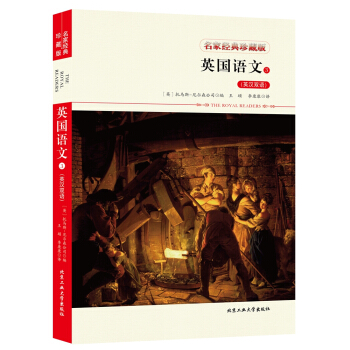

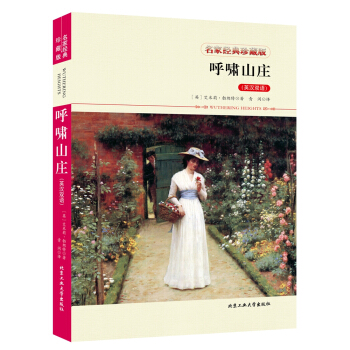
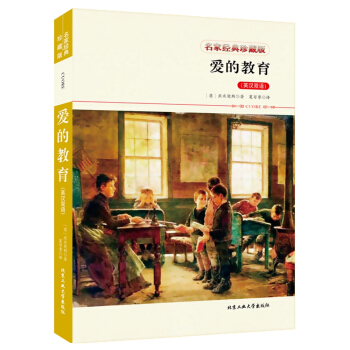
![魯濱遜漂流記(買中文版全譯本贈英文原版 套裝共2冊) [Robinson Crusoe] pdf epub mobi 電子書 下載](https://pic.tinynews.org/12222444/59682aa8N6d0bf337.jpg)

